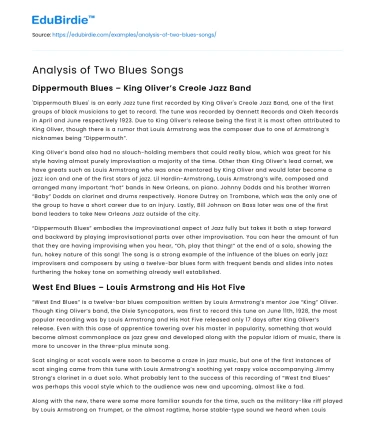Dippermouth Blues – King Oliver’s Creole Jazz Band
'Dippermouth Blues' is an early Jazz tune first recorded by King Oliver's Creole Jazz Band, one of the first groups of black musicians to get to record. The tune was recorded by Gennett Records and Okeh Records in April and June respectively 1923. Due to King Oliver’s release being the first it is most often attributed to King Oliver, though there is a rumor that Louis Armstrong was the composer due to one of Armstrong’s nicknames being “Dippermouth”.
King Oliver’s band also had no slouch-holding members that could really blow, which was great for his style having almost purely improvisation a majority of the time. Other than King Oliver’s lead cornet, we have greats such as Louis Armstrong who was once mentored by King Oliver and would later become a jazz icon and one of the first stars of jazz. Lil Hardin-Armstrong, Louis Armstrong’s wife, composed and arranged many important “hot” bands in New Orleans, on piano. Johnny Dodds and his brother Warren “Baby” Dodds on clarinet and drums respectively. Honore Dutrey on Trombone, which was the only one of the group to have a short career due to an injury. Lastly, Bill Johnson on Bass later was one of the first band leaders to take New Orleans Jazz outside of the city.
“Dippermouth Blues” embodies the improvisational aspect of Jazz fully but takes it both a step forward and backward by playing improvisational parts over other improvisation. You can hear the amount of fun that they are having improvising when you hear, “Oh, play that thing!” at the end of a solo, showing the fun, hokey nature of this song! The song is a strong example of the influence of the blues on early jazz improvisers and composers by using a twelve-bar blues form with frequent bends and slides into notes furthering the hokey tone on something already well established.
West End Blues – Louis Armstrong and His Hot Five
“West End Blues” is a twelve-bar blues composition written by Louis Armstrong’s mentor Joe “King” Oliver. Though King Oliver’s band, the Dixie Syncopators, was first to record this tune on June 11th, 1928, the most popular recording was by Louis Armstrong and His Hot Five released only 17 days after King Oliver’s release. Even with this case of apprentice towering over his master in popularity, something that would become almost commonplace as jazz grew and developed along with the popular idiom of music, there is more to uncover in the three-plus minute song.
Scat singing or scat vocals were soon to become a craze in jazz music, but one of the first instances of scat singing came from this tune with Louis Armstrong’s soothing yet raspy voice accompanying Jimmy Strong’s clarinet in a duet solo. What probably lent to the success of this recording of “West End Blues” was perhaps this vocal style which to the audience was new and upcoming, almost like a fad.
Along with the new, there were some more familiar sounds for the time, such as the military-like riff played by Louis Armstrong on Trumpet, or the almost ragtime, horse stable-type sound we heard when Louis was with King Oliver’s Creole Jazz Band on “Dippermouth Blues”. One strange thing I found in this tune was that the piano, played by Earl Hines, almost takes the role of the banjo and bass, by playing more of a quarter-note feel that I hadn’t heard elsewhere earlier on in this style or far after. The horse stable type sound that we once heard from “Dippermouth Blues” could easily be attributed to Zutty Singleton on hand cymbals. Other than his solo, trombonist, Fred Robinson only tended to stay in harmony with Louis Armstrong and Jimmy Strong.






 Stuck on your essay?
Stuck on your essay?

